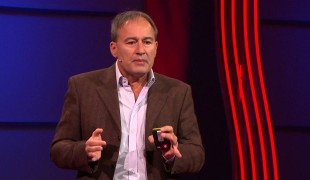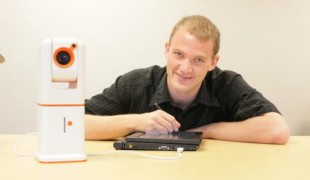- 6470
- 479
- 4
- 5
- 0
- Help Ukraine
About the solution
The idea for this invention came up at TAGlab (Technologies for Aging Gracefully Laboratory), from University of Toronto, a line of research that adapts information technology to help people learn more effectively or assist those who have a cognitive or communications challenge. "Our mantra is 'Technologies for the journey through life'. We look at the needs people face as they age. Then we look around in our grab bag of nifty technologies and we play with them, matching people's needs with adaptations of the technology. And then we find a bright student to explore it and build a prototype and we begin testing it", explained Ron Baecker, computer science professor.
Xavier, who is part of the TAGlab, is working on his idea with Ron, Veilian Pandeliev and Liam Kaufman.
"Xavier came up with the notion that if a machine could record his voice, his grandmother could listen to it over and over again. Hearing his familiar voice makes the experience more pleasant than hearing a computerized voice. That idea has led to our development of ALLT e-book.
According to the professor, ALLT e-book is a unique device in comparison with another existing e-book readers because it features a listening and talking capability. It works by recording the voice of a family member when she or he reads aloud for a person with vision loss; the recorded content can then be replayed later. The team is now testing this solution with individuals who have a hard time reading because of visual loss and because they have difficulties holding books or turning pages.
More info: http://taglab.utoronto.ca
https://wxs.ca
Adapted from: http://bit.ly/2HmRqWb
This solution shall not include mention to the use of drugs, chemicals or biologicals (including food); invasive devices; offensive, commercial or inherently dangerous content. This solution was not medically validated. Proceed with caution! If you have any doubts, please consult with a health professional.
DISCLAIMER: This story was written by someone who is not the author of the solution, therefore please be advised that, although it was written with the utmost respect for the innovation and the innovator, there can be some incorrect statements. If you find any errors please contact the patient Innovation team via info@patient-innovation.com
-
-
474
-
0
-
6826

Father builds software to help his son cope with dyslexia
COMMUNICATION: Communicating, whether by speaking, listening, or other means
Reading
Writing (letters, songs, peoms)
dyslexia
Website
Cognitive impairment
Promoting inclusivity and social integration
Improving Speech and Communication
Caregiving Support
General and Family Medicine
Neurology
Pediatrics
Switzerland
-
-
-
466
-
0
-
6410

Visually impaired student develops a note taker to take notes during class
COMMUNICATION: Communicating, whether by speaking, listening, or other means
Studying
Blindness
Learning Disorder
Educational/Leisure device (book, toy, game...)
Assistive Daily Life Device (to help ADL)
Vision problems
Difficulty concentrating or making decisions
Promoting self-management
Improving Speech and Communication
Caregiving Support
Neurology
Ophthalmology
Psychiatry
United States
-
-
-
534
-
0
-
9780

Dyslexia Keyboard App for iPad and iPhone
COMMUNICATION: Communicating, whether by speaking, listening, or other means
Reading
dyslexia
Speech Disorder
Epilepsy
App (Including when connected with wearable)
Assistive Technology access
Educational/Leisure device (book, toy, game...)
Vision problems
Difficulty speaking or understanding speech
Confusion
Managing Neurological Disorders
Improving Speech and Communication
Neurology
Israel
-
 en
en